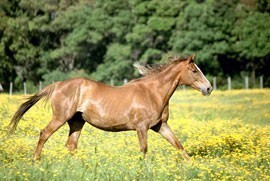
Outbreak of African Horse Sickness in South Africa
Nearly 270 cases of deadly African horse sickness have been reported across South Africa as efforts continue to minimise the impact of the insect-borne disease.
While the number of cases continues to climb, the key Western Cape export zone remains free of the disease and a lockdown is in place in an effort to maintain its status.
A 2004 outbreak which penetrated the export zone led to an embargo on the import of horses by the European Union. It cost the horse industry in South African an estimated R250 million loss of income and job losses.
Authorities report there are 34 horses in South Africa's export facility, Kenilworth Quarantine Station, including South Africa's elite competition horses representing disciplines such as polo, endurance, various Olympic events and, to a lesser extent, horseracing.
Once the horses have completed their 40 day pre-export quarantine on April 15, they will be transported by air to the EU.
While South Africa has banned the transport of horses into the export zone from most provinces, authorities are urging all horse owners, transporters and associations or clubs to exercise great caution when deciding to move horses from outbreak areas.
“Transportation of infected horses remains one of the main sources of new outbreaks that can lead to the death of susceptible horses and negatively impact South Africa's export status,” a spokesman said.
African horse sickness is spread by a midge, which is most active at dusk and dawn. Horse owners are encouraged to stable their horses at the crucial times to reduce the chances of their horses being bitten.
Of the 266 cases so far reported in this season's outbreak, 155 have proved fatal.
A vaccination programme has been in place for several years, but it takes three years to provide maximum protection. The African Horse Sickness Trust reports that provinces with the greatest levels of vaccination are so far faring best in the outbreak.
The latest statistics show 266 cases, of which just 111 survived.
